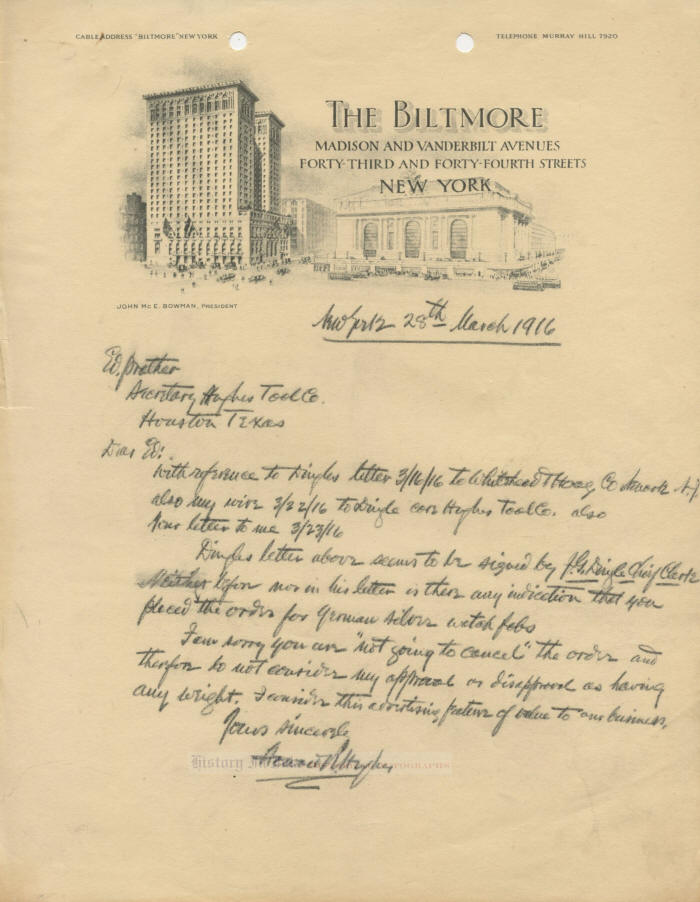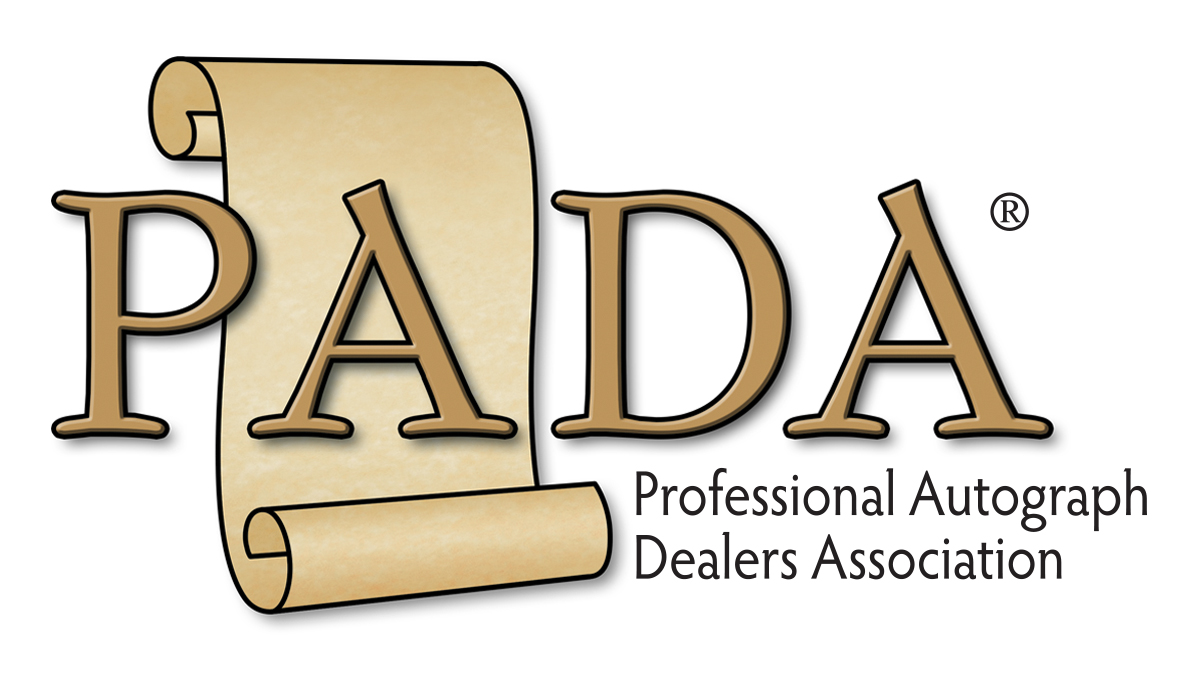2410001
Howard R. Hughes, Sr.
Scroll down to see images of the item below the description
“I am sorry you . . . do not consider my approval or disapproval as having any weight.”
Howard Robard Hughes, Sr., 1869–1924. American businessman and inventor; father of American billionaire Howard R. Hughes, Jr. Autograph letter signed, Howard R. Hughes, one page, 8½” x 11”, on stationery of The Biltmore, New York, [New York], March 28, 1916.
Hughes, the founder and President of the Hughes Tool Company, expresses his dissatisfaction with the company’s corporate Secretary, who had decided not to cancel an order for silver watch fobs for use as advertising giveaways that Hughes believed a company employee named Dingle had made without authority. Hughes appears to be upset that the company’s “chief clerk,” not the corporate Secretary, had submitted the order to Whitehead & Hoag, the country’s largest manufacturer of advertising novelties. He gives the Secretary a not-so-subtle reminder about who was boss—but then, inexplicably, nevertheless says that he found the advertising valuable for the business.
Hughes writes, in full: “With reference to Dingles [sic] letter 3/16/16 to Whitehead & Hoag Co Newark N.J. also my wire 3/22/16 to Dingle care Hughes Tool Co. also your letter to me 3/23/16 / Dingles [sic] letter above seems to be signed by J. G. Dingle Chief Clerk. Neither before nor in his letter is there any indication that you placed the order for German silver watch fobs / I am sorry you are ‘not going to cancel’ the order and therefore do not consider my approval or disapproval as having any weight. I consider this advertising feature of value to our business. / Yours sincerely . . . ”
Whitehead & Hoag, which was formed in 1892, manufactured and sold more than 5,000 different advertising novelty items. In its day, it was the largest advertising novelty manufacturer in the United States. It was the first advertising button manufacturer, and it remained the leading producer of advertising buttons throughout the early years of the industry with a complete button plant that could produce more than 1 million buttons a day. Eventually it sold out to a competitor in 1959.
Hughes, a Missouri native, made his fortune from the Texas oil boom of the early 20th Century. After he and his business partner, Walter Sharp, found that they could not drill wildcat wells through extremely hard rock, they experimented with ways to improve upon the existing fishtail drilling bits. They designed a two-cone rotary drill bit with wood, and Hughes sought and obtained federal patent protection for the Sharp-Hughes Rock Bit. Nicknamed the “rock eater,” it used milled teeth to gouge, crush, and powder rock as it turned. The revolutionary bit was able to drill through medium and hard rock ten times faster than any former bit could do. In its initial testing, the bit penetrated 14 feet of rock in 11 hours when no previous bit had been able to penetrate it at all.
Hughes and Sharp co-founded the Sharp-Hughes Tool Company in 1909. The patents for the drill bit produced the company’s revenue. Hughes took over operation of the company after Sharp died in 1912 and had full ownership by 1914, when Sharp’s widow sold her half to Hughes. By then the bit was used in 11 states and 13 foreign countries. Hughes renamed the company the Hughes Tool Company in 1915.
Hughes’s available autograph material appears to be rare. Our search of auction records has found only three other pieces that have been sold at auction since 1975. Two letters, one handwritten and one typed, and related unsigned material brought $2,300 at auction in 2005. The third piece, a one-page typed employee bonus schedule signed by Hughes and bearing his handwritten emendations, sold for $448 in 2020.
Hughes has written this letter in dark pencil on New York hotel stationery—the classic kind that hotels no longer furnish their guests. The letter has never been folded, so either Hughes mailed it flat or this is his retained copy. Either way, it is in Hughes’s distinctive hand. The letter has a little expected soiling from the pencil graphite. There are two filing holes at the top, not affecting the printed letterhead or any of the handwriting. There is a flattened paper clip impression with a small stain at the upper left, with most of the paper clip stain on the reverse, and there is minor crinkling at the left edge along with three small edge tears that have been archivally repaired. Overall, the letter is in fine condition.
Unframed.







